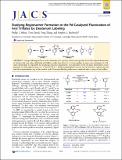Studying Regioisomer Formation in the Pd-Catalyzed Fluorination of Aryl Triflates by Deuterium Labeling
Author(s)
Milner, Phillip John; Kinzel, Tom; Zhang, Yong; Buchwald, Stephen Leffler
DownloadBuchwald_Studying regioisomer.pdf (2.165Mb)
PUBLISHER_POLICY
Publisher Policy
Article is made available in accordance with the publisher's policy and may be subject to US copyright law. Please refer to the publisher's site for terms of use.
Terms of use
Metadata
Show full item recordAbstract
Isotopic labeling has been used to determine that a portion of the desired product in the Pd-catalyzed fluorination of electron-rich, non-ortho-substituted aryl triflates results from direct C–F cross-coupling. In some cases, formation of a Pd-aryne intermediate is responsible for producing undesired regioisomers. The generation of the Pd-aryne intermediate occurs primarily via ortho-deprotonation of a L·Pd(Ar)OTf (L = biaryl monophosphine) species by CsF and thus competes directly with the transmetalation step of the catalytic cycle. Deuterium labeling studies were conducted with a variety of aryl triflates.
Date issued
2014-10Department
Massachusetts Institute of Technology. Department of ChemistryJournal
Journal of the American Chemical Society
Publisher
American Chemical Society (ACS)
Citation
Milner, Phillip J., Tom Kinzel, Yong Zhang, and Stephen L. Buchwald. “Studying Regioisomer Formation in the Pd-Catalyzed Fluorination of Aryl Triflates by Deuterium Labeling.” Journal of the American Chemical Society 136, no. 44 (November 5, 2014): 15757–15766. © 2014 American Chemical Society
Version: Final published version
ISSN
0002-7863
1520-5126